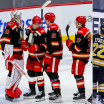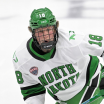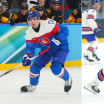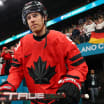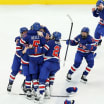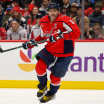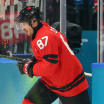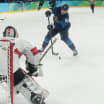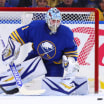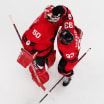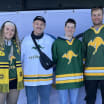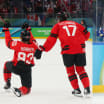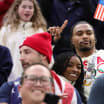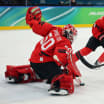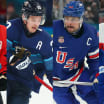The 2017-18 NHL season has passed its midway point, and the 2018 NHL Trade Deadline on Feb. 26 is less than five weeks away. With that in mind, NHL.com is sitting down this week with some of the biggest names in the game. Today, Tom Dundon, who became majority owner of the Carolina Hurricanes on Jan. 11, talks about his plans for the Hurricanes and expanding the fan base in Raleigh.
Hurricanes owner brings high hopes to Carolina
Passionate Dundon wants to 'rebuild this brand,' give fans a winner
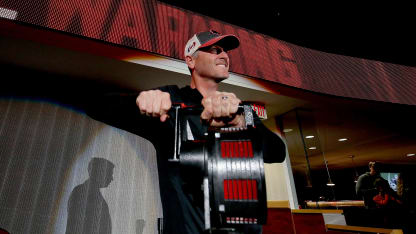
© Gregg Forwerck/Getty Images
RALEIGH, N.C. -- Walking the PNC Arena concourse prior to the Carolina Hurricanes' game against the Vegas Golden Knights on Sunday, Tom Dundon was a popular man.
Dundon blended in wearing a Hurricanes cap and black hoodie, but fans recognized the team's new majority owner anyway and were eager to welcome him to Raleigh. Many were season ticket holders who simply wanted to shake his hand and say, "Thank you."
Some were concerned about the Hurricanes' future before Dundon, the 46-year-old chairman and managing partner of Dundon Capital Partners, a Dallas-based private investment firm, purchased 61 percent of the team from Peter Karmanos. Since the sale was completed on Jan. 11, Dundon has been thrust into the spotlight.
It's not a position he's comfortable in.
Dundon, believes the players should be the face of the team. But for now, the former CEO of Dallas-based Santander Consumer USA (1995-2005), said he's willing to accept his role as fan favorite.
"That wasn't necessarily something I anticipated, and I was on the opposite side of publicity my whole life. I was trying to avoid it," he said. "Now, we need to rebuild this brand, so I feel an obligation to do whatever my part is."
So, Dundon revved up the crowd of 15,303 by cranking the Hurricane Warning Siren and then headed to a suite to watch the game. This was his second game of the day.
He spent the afternoon in Charlotte watching the Hurricanes' American Hockey League team play against Rochester.
Watching the Hurricanes' 5-1 loss to the Vegas Golden Knights, he demonstrated how invested emotionally he's become in the Hurricanes, who entered Wednesday five points behind the Pittsburgh Penguins for the second wild card into the Stanley Cup Playoffs from the Eastern Conference. He seemed to live and die with each scoring chance, pausing the interview to blurt out "shoot that" or correctly observe that Vegas' James Neal, who scored his 21st goal later in the game, was the wrong guy to leave open on the right wing.
"This is the part that clearly I'm not cut out for," Dundon said after the Hurricanes fell behind 3-0. "It makes me feel sick."
Dundon has a lot of ideas and is figuring out much of this on the fly. He shared some of his plans with NHL.com while watching the the Hurricanes' loss to Vegas on Sunday.
On his confidence in general manager Ron Francis and coach Bill Peters
"My going-in assumption in most of the things I do is that people just need resources and structure, assuming they have passion, work ethic and intelligence. Those guys clearly have those things. Once I knew that, now I've got to figure what resources we need to provide them to go from here to where we want to go."
On how much he's learned about the sport since he started following the Hurricanes in the preseason
"I've definitely learned some things, but it's hockey and there are technical things that someone that played or coached hockey are going to know better than me.
"But I know enough to ask the questions that we can go between the scouts and the hockey guys and the data that we can come up with some philosophies that we can consistently make informed decisions and not emotional decisions. That's my goal."
On how involved he'll be in hockey operations
"I have no desire to tell anyone who to draft or who to play. I simply want to make sure we're prepared as an organization and that the decisions we make are debated and based on good information. If we can consistently do that, then the people that are here will get to keep making the decisions. There's a difference between when the odds are close and using your instinct and experience, and when something's obvious. When things are obvious, you'd like to think the organization is going to go in that direction. That's kind of what I've seen so far. And if there's things that are debatable, they want the information. They hired the analytics guy before I got there.
"They're trying to find insights. A lot of it is just challenging what you already know."
On building a practice rink and his other initial plans
"We've got a guy named Eric Tulsky that runs the analytics department who is really good, but he's in essence a one or two-man show. So I think we've got to make a much bigger commitment to that. And on the team side, just making sure everything we do is best in class: nutrition and training and coaching video, amenities, whatever is needed to help these guys optimize their performance to make sure being on this team, being part of this brand they're proud of it and believe they have an advantage. I don't think we can objectively say that's the case right now."
On trying to create an advantage
"I noticed the (New England) Patriots won again [Sunday] and they were losing the whole time, and no one is surprised. You expected it. That didn't come quick. We've got to start that process, and there's a lot of pieces in that. Most teams in sports have that same goal and they're probably not that far away from it. They do a lot of the same things. They're playing the same sport. They've all got coaches, scouts, nutrition, video. They've got strength coaches. They've got game plans. There's a lot of similarities. Yet, there's something different. And that's what I've got to figure out."
On increasing the season-ticket base (according to the Hurricanes, they have roughly 7,200 season ticket holders)
"I wouldn't put a number on it. The goal is to do all the things we're supposed to do. I think the goal depends on how much winning we do. The more we win, the more people are going to come. We're hopefully going to set something up where -- because we're a young team and people believe we're going to do the right thing -- we're going to give them value, they're going to be entertained. We want people not to miss out on that process. If we can help these fans build a relationship with the players and invest in the players, then I think it's more like they'll come."
On how qualifying for the playoffs for the first time since 2009 would help that process
"It's the most important (factor) and the hardest to control. I think it's clear we've got a foundation that your probabilities are strong. You wouldn't have to convince yourself like you would on some other things. You can get objective and know that if you make good decisions for the foreseeable future you're going to be sustainable as a competitive team. Whether or not we can be one of the top couple teams, I don't have a strong opinion on that. But I have a very strong opinion that we're super competitive right now."
On seeing the fan base potential from the past (2002 Stanley Cup Final, 2006 Stanley Cup, 2009 Eastern Conference Final)
"The good thing is there was proof. There's been other markets where you'd say, 'Oh, that's never going to work.' Here you know it's going to work, but we have to acknowledge that they haven't had a reason to have a lot of hope. I think if we give them hope and a little more value for their experience."
On the fans' in-game experience
"This is entertainment, it's almost like a TV show, and it's not up to the standard that I want it to be. It's the music and the timing and the video playing. There's a hundred little things you've got to do to change that. We've got to look at what everybody does, and there's some equipment we need that we're going to buy. There's a bunch of ways to do it."
On improving in-game operations
"I'm bringing my entire (game-production) staff with me to Dallas this week. The (NBA) Mavericks are going to host them and the Stars are going to host them, and we're going to see how they do their in-game production. I've been to some of these other arenas and we've contacted some of the other teams and everybody's very helpful. We're all in this together, right? ... What I've told them so far is let's get to best in class and then we'll figure out how to be better."
On if he was a hockey fan when was younger
"I grew up watching hockey. I was born in New York and lived in South Jersey by Philadelphia. When I was a little kid, my parents watched the New York Rangers. I was 9 years old when the U.S. Olympic team won (at Lake Placid in 1980). That's one of my biggest memories as a kid. Then, living in Dallas, they got a team, so I went to all the games. You follow that process and they were pretty good. I was a season ticket holder for many years. … When I was either right out of college or a student and didn't have excess capital, I don't remember how I went, but you'd find a way to pay $5 or sneak in or whatever it was.
"So I've been watching hockey my whole life. When I watch sports, I watch it probably different than a casual fan because I'm interested in the process."
On why he wanted to own a professional sports team
"It's not the money. It's probably the worst financial thing I could do with my time and money. That doesn't mean it's good or bad. I'm saying it had nothing to do with the money. I just enjoy it. The idea of doing this and hopefully helping put the pieces in place to get continuous success it's my hobby. It's what's interesting to me. It's what stimulates me. I don't know why. I wish I could explain it. I just know that I enjoy thinking about it, obsessing about it, and I know when it doesn't go well how miserable I am. You're looking for those life experiences and those emotions. Other than with your kids and your family, I don't know any other way to get this sort of passion."
